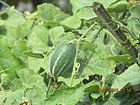Note: This is a project under development. The articles on this wiki are just being initiated and broadly incomplete. You can Help creating new pages.
Difference between revisions of "Trichosanthes dioica - Patola"
(→External Links) |
(→List of Ayurvedic medicine in which the herb is used) |
||
| Line 47: | Line 47: | ||
==List of Ayurvedic medicine in which the herb is used== | ==List of Ayurvedic medicine in which the herb is used== | ||
| − | + | * [[Patolakaturohinyadi kashayam]] | |
| + | * [[Patolamooladi kashayam]] | ||
| + | * [[Patoladi ghrita]] | ||
| + | * [[Patoladi churna]] | ||
| + | <ref name="Ayurvedic preparations"/> | ||
==Where to get the saplings== | ==Where to get the saplings== | ||
Revision as of 09:17, 14 June 2019
Patola is a perennial, climbing plant producing stems that can sprawl over the ground or climb into other plants for support, attaching themselves by means of tendrils. The plant has been cultivated, especially in eastern India, for over 2,000 years. Its edible fruit is highly prized in India
Contents
- 1 Uses
- 2 Parts Used
- 3 Chemical Composition
- 4 Common names
- 5 Properties
- 6 Habit
- 7 Identification
- 8 List of Ayurvedic medicine in which the herb is used
- 9 Where to get the saplings
- 10 Mode of Propagation
- 11 How to plant/cultivate
- 12 Commonly seen growing in areas
- 13 Photo Gallery
- 14 References
- 15 External Links
Uses
Arthritis, Burning sensation, Anorexia, Itching, Skin diseases, Fever, Cough and cold [1]
Parts Used
Chemical Composition
Common names
| Language | Common name |
|---|---|
| Kannada | kahi-padavala |
| Hindi | palval, palwal, parvar |
| Malayalam | kattu-potolam, patolam |
| Tamil | kombu-pudalai, musu musukai, peypputalai |
| Telugu | adavi-patola, kambupotala, kommu potla |
| Marathi | NA |
| Gujarathi | NA |
| Punjabi | NA |
| Kashmiri | NA |
| Sanskrit | bijagarbha, karkasa, karkasacchada, kulaka, meki, patola, rajiphala |
| English | Pointed gourd |
Properties
Reference: Dravya - Substance, Rasa - Taste, Guna - Qualities, Veerya - Potency, Vipaka - Post-digesion effect, Karma - Pharmacological activity, Prabhava - Therepeutics.
Dravya
Rasa
Tikta (Bitter), Katu (Pungent)
Guna
Laghu (Light), Rooksha (Dry)
Veerya
Ushna (Hot)
Vipaka
Katu (Pungent)
Karma
Pitta, Kapha
Prabhava
Habit
Identification
Leaf
| Kind | Shape | Feature |
|---|---|---|
| Simple | alternate | Leaves 7.5cm long, ovate oblong, cordate, rigid, rough on both surfaces. |
Flower
| Type | Size | Color and composition | Stamen | More information |
|---|---|---|---|---|
| Unisexual | Axillary | White | Flowers are dioceous, male not racemed, woolly outside. |
Fruit
| Type | Size | Mass | Appearance | Seeds | More information |
|---|---|---|---|---|---|
| A pepo | 5 - 9cm | oblong or nearly spherical,
smooth, orange red when ripe |
{{{6}}} |
Other features
List of Ayurvedic medicine in which the herb is used
Where to get the saplings
Mode of Propagation
How to plant/cultivate
Season to grow
Soil type
Propagation
Commonly seen growing in areas
Photo Gallery
References
- ↑ "Uses"
- ↑ "Vernacular names"
- ↑ PLANTS OF KERALA VER.2, N. Sasidharan "BOTANIC DESCRIPTION"
- ↑ Cite error: Invalid
<ref>tag; no text was provided for refs namedAyurvedic preparations
External Links
- Pages with reference errors
- Ayurvedic Herbs known to be helpful to treat Arthritis
- Ayurvedic Herbs known to be helpful to treat Burning sensation
- Ayurvedic Herbs known to be helpful to treat Anorexia
- Ayurvedic Herbs known to be helpful to treat Itching
- Ayurvedic Herbs known to be helpful to treat Skin diseases
- Ayurvedic Herbs known to be helpful to treat Fever
- Ayurvedic Herbs known to be helpful to treat Cough and cold
- Herbs with Leaves used in medicine
- Herbs with Fruit used in medicine
- Herbs with Root used in medicine
- Herbs with common name in Kannada
- Herbs with common name in Hindi
- Herbs with common name in Malayalam
- Herbs with common name in Tamil
- Herbs with common name in Telugu
- Herbs with common name in Sanskrit
- Herbs with common name in English
- Habit - Climber
- Index of Plants which can be propagated by Seeds
- Index of Plants which can be propagated by Cuttings
- Herbs that are commonly seen in the region of Tropical area
- Herbs
- Cucurbitaceae
- Ayurvedic herbs that don't have seed photos




